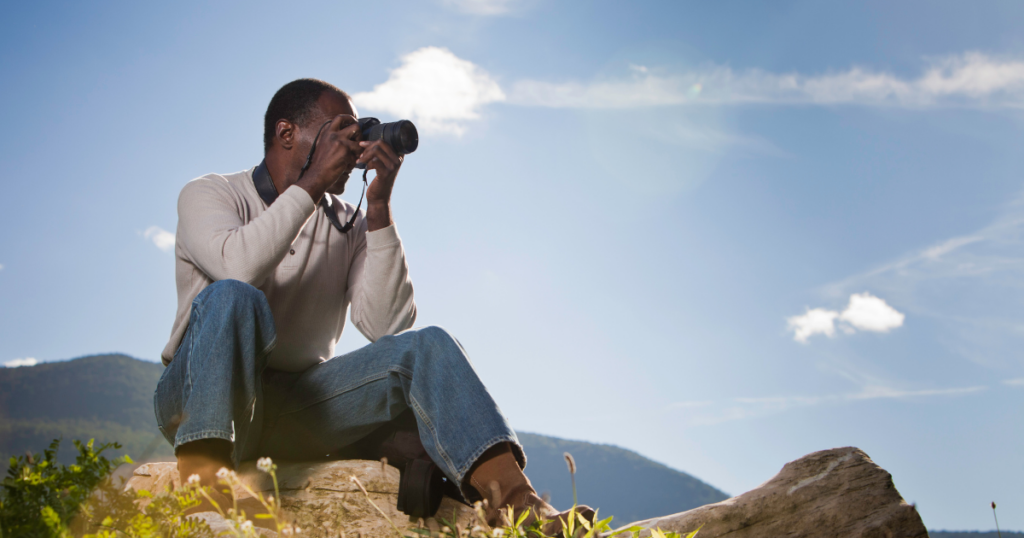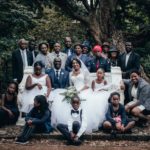Episode 11: Going from Corporate America to Owning A Business with John Branch IV
John Branch IV is a wedding and events photographer and business influencer with over 180,000 followers on YouTube who come to him for advice on launching and running a profitable photography business. He speaks with PocketSuite about his journey and how running is own business beat working at the top of corporate America. He has some smart ways of looking at growing a business, making more sales and creating a personal brand. Our podcast is available on YouTube and all major podcasting apps.
Find links to John Branch IV YouTube page and business website along with a full transcript below.
Follow PocketSuite
Follow John Branch IV
Website: https://jbivphotography.com/
YouTube: https://www.youtube.com/c/Jbivphotography
Full Transcript
PocketSuite::
Welcome to the Booked Solid Podcast. I am your host, Hansa Bergwall. Of course, we are the podcast for everyone with clients to run and grow a business. We have a fantastic guest for you today, John Branch. He is a wedding photographer with a very popular YouTube channel. I think you’ve got like 180,000 subscribers now or something like that.
John Branch:
Yep. Around there.
PocketSuite::
So thank you so much for joining us, John.
John Branch:
Happy to be here.
PocketSuite::
So first maybe you could start by just introducing yourself and your story. How did you get into photography and how did you get into wedding photography in particular?
John Branch:
Yeah, so I’m John Branch, as said, and I’m a wedding photographer and I’ve been doing it for about 10 years now. Funny enough, I actually majored in music production and sound design, but later on got into photography just because I love the arts in general. I’ve dabbled in most of them, and the real reason I got into photography was more so a means to an end. My wife, when we started having kids, wanted to stay home and I was thinking I needed to pick up a second job, but she told me to start a business. At the same time, I had a failing audio business, which is a longer story, and also I was getting a lot of people just telling me, “Hey, your photography’s actually not so bad. You have a pretty good eye for it.”
So I took about a year to really study the craft of photography and just jumped in head first. I think wedding photography, mainly because I’m just more of a people and events person. I really like events. Growing up, I was the eldest child of the eldest children, so my parents were both the oldest, so I was the first grandkid out of all of the kids that were had. Because of that, I was a ring bearer in at least, I want to say three, maybe four weddings, and I just remember liking weddings so much when I was little, so I feel like that’s why I just gravitated towards them again, and I really just jumped into weddings and here I am now 10 years later, doing well still.
PocketSuite::
Tell me about the first wedding that you shot, if you can remember.
John Branch:
Oh yeah. So my first wedding, I was booking-
PocketSuite::
The first one you land the gig. That’s the real question. Everyone talks about that first time making the sale. It’s so hard.
John Branch:
Yeah. Oh, it is. It’s definitely the hardest. I was using a service called Thumbtack at the time, which they’re still around, and the way they worked is you paid money to buy tokens, and then when you applied for a job, when someone needed help, you used those tokens. My little loophole I found at the time is that if you applied for engagement sessions, they cost less tokens, and then I would try and convert those couples into actual weddings.
So my first wedding came from Thumbtack and it was actually a very, very small, they didn’t want much. They were just like, “Hey, could you cover the ceremony and maybe a little bit of pictures after? No big deal.” And yeah, it went really well. Actually, most of the time when I go back and look at those photos, I’m surprised they really aren’t that bad. A lot of times photographers love to be like, here’s my first work, and it’s like, Ugh, what happened? My stuff’s actually, it’s fairly decent, surprisingly enough, and it was a fun little wedding. I was maybe there for four hours. It was a great introduction. And then I kept using that same process of using Thumbtack to book engagements that turned into weddings to continue on from there. And then I just started naturally getting weddings.
PocketSuite::
So just you got your first… I like that story of coming in through the side door, working a system that you found, get in on an engagement photo moment, the popping the knee under the cherry blossoms or at the seashore, and then having a great experience and then you’re the natural person to ask about the wedding as well, that’s a good plan. It seems to me that event photography is so specific and so high pressure, you really have to get it at the moment, and if you miss it, it’s hard to do it again. What is that like, navigating that? It sounds like, I don’t know, really high pressure every time.
John Branch:
Yeah, very high pressure. There’s a couple of things I talk about often that helps me deal with the high pressure of events, and from a technicality point, I always tell photographers to focus on practicing with street photography. When I started my business, I was in New York, so I was in the perfect place for doing street photography, but what I personally always found that was the same between street photography and wedding photography is that if there’s a moment about to happen, you have to learn to anticipate it and already have an idea of the composition you want in your mind and be able to snag it as it happens. And there’s no going back. You can’t go up to the bride and groom or something later and be like, oh, excuse me, could you stop and do the first kiss again? Or I think I saw a clip somewhere where the photographer yells at the couple because they were going for the first kiss, but the photographer wasn’t ready and it was just like, no.
So street photography and wedding photography have that same instantaneous, you have to anticipate it, see it, and grab it and know your settings are correct. And I think that’s a great way to practice because at least in street photography, if you miss it, no big deal. Get used to getting those shots there and then transfer that over to weddings.

PocketSuite::
Yeah, yeah, yeah. But in weddings too, how common are things like ugly crying, red wines spill on white dresses, things like that?
John Branch:
Luckily it’s not that common. So in my 10 years, my closest story to that, God, it was tragic. Oh my goodness. Me and the groom were going out to take some portraits. It had rained earlier, but it stopped, and we were going to this spot where they wanted to take photos and there was a little bit of a hill in this parking lot, and me and the groom were both like, “Hey, let’s walk around this way.” But she decided to go over the hill because it was the fastest way and she slipped.
PocketSuite::
She slipped?
John Branch:
Yeah, and this was before the first dance and everything, and it was just like, oh, and there’s this mud all on the back of the dress, and it was like, oh my goodness. And we were able to take the photos we needed without being able to see the mud, but she handled it in stride. She did really well, but it was definitely like, oh no. But that’s 10 years. So that’s like the one time I’ve ever [inaudible 00:06:57].
PocketSuite::
Okay, that’s good. You’re always thinking that something is going to happen moments, and I’ve always thought about that too. Does the emotion of the moment really translate into the pictures, or do you have to create that with your craft? I’m thinking of how often I take a picture at a beautiful sunset and then you’re just backlit and it doesn’t work.
John Branch:
Yeah, yeah. There’s definitely two sides to it. I think sometimes the moments really do truly just happen and you’re there and you’re able to capture it. But most of the time, the way I look at it, a lot of the times, our day to day is very mundane, for the most part. Exciting things only happen when they do. So sometimes you do have to lead people to those emotional moments, which I think is a huge part of a wedding photographer’s job. So it’s not that I have to make things so perfect so that the photo is perfect, but more so I know that, Hey, I’m going to stand you here and then this person’s going to come to you and y’all are going to fill the space with emotion, but I’m going to hands off, but I need you to at least be here because that’s what’s going to make it look nice. Give them some prompts or something, ask them questions, something to think about. That stuff will lead you to the emotions.
I will say, I think one of the best emotional photos I’ve ever had, my couple, it rained on their wedding day pretty heavily, and they were supposed to have an outdoor ceremony, but they were cool and trusted me enough that when their guests started arriving, they actually did their cocktail hour twice. So they did it when the guests arrived to wait for the rain and then the rain stopped and this one shot, I absolutely love this shot of them after the first kiss and everything, and they’re walking back out and you could just tell they’re super happy and the guests are just like, yeah. And again, I was there for the emotions. So that’s another reason why I liked the photo so much is I just remember how they were still able to have their outdoor ceremony like they wanted, and it was just really… So that’s the two. You have the handheld emotions where you lead it, and then you have epic moments where the story leaves the photo and there’s always a story behind the photo.
PocketSuite::
I love that. The rain clears and stuff like that, those great moments. So about 10 years ago, you had your first wedding. Tell me about the journey of going from getting wedding jobs to starting to build a brand and launch a YouTube channel and help other people succeed in this business.
John Branch:
It’s a very interesting journey, and I feel like you’re always learning. One thing I do love about wedding photography or client-based services is that you can learn from any industry. And at the time, so I had shot for about four to five years while I had a day job. I used to work at Apple, and I also worked at Squarespace. So I was in two companies that had really high level customer service, and I learned a lot that I could apply to weddings for that. And over the years, it’s really was just seeing how similar all of these jobs are, because a lot of times I think photographers get blindsided by the art of photography and how your photos are supposed to look and miss the fact that wedding photography is pretty much 85% customer service, just how you’re dealing with your couple, how you’re helping them plan out the day, how you’re setting expectations. Because if you’re not doing that stuff, things can easily fall apart. And that was things I learned-

PocketSuite::
Tell me a little about about the John Branch style of customer service. How does the journey begin for the people that you work with and how do you make sure it really shines throughout?
John Branch:
Oh my goodness. I think the two biggest things I like to focus on, and this is why on my website, my approach is artistry and authenticity. Authenticity is the biggest one. So I try to just be me upfront and forward the whole way through and letting my couples know what they’re receiving because they’re just receiving me. One way to explain that is the fact that I usually tell couples that I’m attending their wedding more so taking it away from just being the photographer at your wedding. I’m attending your wedding as a guest, and that’s the feel I want everything to be. So that’s one side of it.
And then the second side of it is very handhold-y, more so in the fact that I like to plan, I like to… And the funny thing is I’m really not a planner. I’m a very go with the flow type of person, but I’m going to help my couple with their timeline, even if they have a planner so they can see what the photographers think is going to work for the timeline, and then me and the planner can work that together. And that section of it lets them know that even though I may seem so nonchalant and very chill about everything, that I’m very much thinking about a solid, this is what we’re going to do at this exact time type of plan. And then within having a plan, in my opinion, there’s freedom.
There’s much more freedom when you’re like, okay, these are the times we’re going to go, but I’m going to show up early, so if you’re ready, we’ll start shooting then. And then if we have extra time, whatever, it’ll be great. So it’s a lot of that getting me and this just very much laid back approach with very guided guidelines.
PocketSuite::
Yeah, that’s great. That actually makes sense to me because if you are a go with the flow person, what you need is a planner to make those pictures happen so that you can just go with the flow of that plan and then enjoy your day and not have to do it yourself, as it were.
John Branch:
Yeah.
PocketSuite::
That’s customer service, right? Make the plan and then let things fall where they may, if rain happens or things have to be change, but…
John Branch:
Exactly. Exactly.
PocketSuite::
Be the one to do the work of making it happen work. Because it’s work.
John Branch:
It’s a lot of work.
PocketSuite::
And yeah. Tell me about starting your YouTube channel. How did that begin?
John Branch:
So my YouTube channel was actually a longer story-ish because I had a YouTube channel in the past where I was teaching about music production and sound design. So I had YouTube chops from the past, but back then I had no goal or idea. I don’t know, I just liked making videos, I guess. I got that channel to about 9,000 subscribers, and that was back in the golden age of YouTube, like 07, 08.
PocketSuite::
Oh, yeah.
John Branch:
So when I moved back to North Carolina from New York, this is also when I quit my day job and went full-time wedding photography. My wife and I were living off of our savings at that point because we literally just up and left to New York with no plan at all. So I was here and I was like, “You know what? I think I’ll just start doing YouTube again.” No real reason. And I can remember telling my wife, “I’m just going to do it. I’ll try and do a video a week or maybe two a month and not really care.” And I think I got about 20 videos in, and I had one do pretty well, and then I got into the YouTube monetization program. So then I was like, well, I guess I should do at least once a week, and it just flowed from there.
So I already had a natural knack for YouTube. Again, I majored in music production and sound design where I was working on commercials and TV shows, so audio editing is the cousin to video editing. So that wasn’t too hard for me to do.
PocketSuite::
Yeah, of course.
John Branch:
So yeah, I had all the skill sets already just there because when I first started, lot of people were always like, wow, your quality is so high. And it’s like, well, I’d been a photographer for six years. I understood lighting composition. I’ve been editing audio, I literally went to school for it, and videos just the same. Most of the time when I edit my videos, I edit like an audio engineer. So it all made sense, fell into place. And people liked how I teach.
PocketSuite::
And you actually offer a course in having your own YouTube channel. Can you talk a little bit about that? It’s on your website.
John Branch:
Yeah, so that course is a very starter course. I want to go more in depth, but it’s a very great place to start out. And just like, I don’t really know how to approach YouTube. I don’t know how to plan out my videos and make them impactful with the algorithm. Maybe I don’t know as much about cameras. What’s a great starting place? It’s a lot of that stuff that gets you started and in the door because what I’ve found at least, and I guess I just have the natural ability, but you have to find what people want to see. What I would say is the downfall of most people starting YouTube is they lean too much on only what they want to do in their videos, and they don’t make it enticing for the people who are trying to find something, if that makes sense. Because again, you can talk about very obscure things. You just have to find a way to make people be like, oh, that’s a thing that I want to hear about basically.
PocketSuite::
So talk me through that process and how you choose a recent title for a video you made.
John Branch:
Yeah, so there’s two answers to that. So the first one is what I have called riding waves, not bandwagons. So basically what that is, if there’s a subject that you talk about often, it’s under what I would call your umbrella of topics. Find places where that topic is becoming popular, but you’re riding the wave because it’s something you already do. Bandwagons are things that you don’t do, but you’re doing it like, well, everyone else does it. It’s the only way to get seen by the algorithm.
My example of this is my first video to do well was about editing photos on an iPad in Lightroom, which this was back when no one thought it was legitimate. So as a professional, I was like, you can actually professionally edit your photos, but when did I release that video? When a new iPad was announced, so I was riding that wave, okay. And the video did really well because no one else talked about it and everyone was searching for iPads. So then people who didn’t even think about it maybe, it came up and they’re like, oh, yeah, how cool. So that’s the first thing.

The second thing for your titles and stuff is really thinking about, again, what other people would want to see. Now, I start this out with research. I use a program called vidIQ, and it has a lot of data in it that you can search through, but you can do this just on YouTube itself, search in the search bar, and you’ll see recommendations that will come up and use that to formulate your title, because that’s the thing. I’ll sit down and brainstorm my videos, but then also go back and search and use vidIQ to really hone in on how I should title it. Because the biggest mistake I see a lot of people make is they’re still using what I would consider blog titles for their videos. And those don’t translate well to YouTube. They’re great titles, it’s better suited for a blog.
PocketSuite::
It’s a different medium.
John Branch:
Or something of that sort. Yeah, it’s a very different medium.
PocketSuite::
How important are your YouTube, social media in terms of getting new clients, or is it monetized in other ways? I know that one of those truisms about marketing right now is be on social media, but I’m wondering, where do you get most of your wedding clients? Is this a channel for them or is it really other things?
John Branch:
Yeah, so it actually has turned into the majority of my inquiries now, which I never thought it would do that. I’ve been very surprised myself. But what it seems like is that one person in the couple is slightly into photography, and so they find me and they’re like, oh, wow, John Branch, it’d be so cool… I actually even, because I’ve been doing the full wedding behind the scenes videos, I’ve had couples who are like, “I’d love you to do one of those for ours as well.” So I was very surprised.
But I think it’s just because I’m, again, authentically just showing myself and what I do and they can see that and respect it. So I do think it’s really big, and that goes for any social media in general, just really show yourself and what you’re doing and who you are, and people will eventually be like, wow, this is so cool. I like how you did X, Y, Z. The more someone can get to know you, the more comfortable they’re going to feel. This is why, actually, I’m even updating some of the stuff on my website and my contact form replies with actual videos. Because it goes so far, and I know a lot of photographers, they’re like, I don’t want to do video, but if you can sit down in front of someone without actually having to sit down in front of them and they can get to know you, it’s almost like watching TV shows, you feel like the characters because you’ve been watching them live out whatever story it is.
PocketSuite::
As a marketer, I can just underline that. If you can get someone to take the time to watch a video, it is very powerful.
John Branch:
Extremely powerful. Yeah. Again, I had no idea it would happen with YouTube, and again, I’m not getting as many leads as I used to, but the leads I get are extremely strong and hot leads. I really don’t even have to… I have meetings with my couples, but they’re just like, yeah, you’ve seen what I do, you know so much about me already. So I’ll just answer some questions and we’ll go from there.
PocketSuite::
Right. You already made the sale by doing the videos, so they come in much more ready to say, you are the one we want. I’ve watched 10 of your videos and I’m convinced.
John Branch:
Yeah, I had a couple pretty much tell me, they were just like, tell me how much we have to pay you. And I was like, wow. I was like, this is crazy. I never had this before.
PocketSuite::
Oh, what are the opportunities you see in your industry right now in photography specifically? Where do you think the industry is headed?
John Branch:
Oh my goodness, this is such a good question too because I think about that often myself, and I think that that’s what happens when you’ve been in it for about a decade. You start being like, things are different and they’re changing. Media in itself I think is a big opportunity. People love to feel like they’re in their own reality TV show, and I feel like there’s a way to really hone in on that for couples. We’re already starting to see photographers hire a TikTok specialist on the day of to just make TikToks and reels and stuff for the couple. I feel like I see a lot more of that maybe.
PocketSuite::
Yeah. That is a big trend overall in the marketplace of everything right now is just gone are the days of the top thing being the Instagram filter and the absolutely gorgeous people. People really want those more raw, real TikTok-y moments. The more behind the scenes, the more authentic sort of side note that is behind those big moments. And if you can capture those two maybe in video, is that how you would do it, these behind the scenes wedding videos you were talking about?

John Branch:
Yeah, definitely. And it’s easy. Hire someone and hand them your phone and just like, Hey, record stuff. And when you get back home, you can figure out what to do with it later, but just record anything.
PocketSuite::
Yeah, it’s funny because I think of wedding photography as being that ultimate expression of the polished photograph event moment, but even that is moving in this, yes, we’ll have that, but also the bloopers behind it and the authentic stuff that happens behind the scenes.
John Branch:
Yeah. And I think it depends on the couple too. I think there’s a clear divide. There’s people who want very just real and raw, and then there’s other people who basically want you to cover it like Vogue, and they want all of the video to just be very clean and even the behind the scenes to just be very cute and clean. So yeah, I think media in itself is where photo is moving. And again, I know for photographers they’re like, I’m just trying to take photos, but even seeing it from the YouTube perspective, it goes a long way. People love to see things happening and feel like they’re at the actual event.
PocketSuite::
So why did you decide to go in the direction of offering courses, creating videos for newcomers? Was it a lot of people were asking you? Did you identify an opportunity, just that natural impulse to mentor?
John Branch:
Yeah, more so than natural impulse to mentor. I’ve always, for some weird reason, just absolutely love to teach people, and it’s always come from a place of when I’ve understood something to the degree that I understand it, I want to help you understand what I’ve figured out. And again, a great place that really shows that I just like doing that for literally no reason was my previous YouTube channel where I was teaching audio production. Yeah, I would make some money. I would get a hundred dollars check every couple months, but there was literally no reason for me to do it. I was just like, I love teaching. Check out this thing I figured out how to do. So that was really the first place. I myself had a mentor when I was about three to four years into wedding photography, which he definitely saved me because I was doing well, but I had no idea what I was doing. He definitely helped out with places to be like this, how you should do these things.
PocketSuite::
How did you connect with your first mentor? Who was she? How did you find her?
John Branch:
So my mentor was Phil Porto of the Portos, and we met at a workshop and if I remember correctly, we hung out a little bit, but not a lot, but we hung out enough to know of each other. And then he was posting that he needed a photographer, like an associate photographer in the New York area, because he is from there, but he lives in Florida. And I was just like, “Hey, I am willing to try that out.” And he was like, “Oh, I remember you from the thing.” He was like, “Yeah, sign me up immediately.” And then from there, he just took me under his wing and honed in on a lot of stuff.
And it’s the same thing that I want to do for other photographers because photography in itself and having my own business has made a huge impact on my life. So really at the end of the day, I just want to share stuff. And I know it’s hard nowadays, because there’s a lot of people just floating around making courses. It’s actually one of the, I don’t know if I can call it imposter syndromes, but it’s one of the things I deal with being like, I want to make a course that’s fairly priced, but I don’t want people to feel like, oh, here he goes, another person on YouTube making a course. That’s why I also have a lot of free stuff, because I really do genuinely just want to teach people.
PocketSuite::
[inaudible 00:27:18].John Branch:
And I have a three-hour video, it’s free. Other photographers are like, wow, this guy put a whole three-hour video for free. Yeah.
PocketSuite::
We see it being a platform where people run businesses is that a lot of businesses fail in their first couple years, but we’ve noticed that talking to the ones who succeed is that they follow that natural impulse to look for mentors, to look for coaching, to reach out and make connections in their industry, and they stop it with a lonely road thing where they think they have to figure out absolutely everything for themselves. So what’s your advice to someone in that position who’s looking for the right advice, the right coaching, the right courses, the right… In any industry? How do you find the right person for your business?
John Branch:
That’s a great question. I would say first and foremost, really vet out your coaches and understand their strengths. Because again, there is, especially in our internet economy right now, there’s a lot of people who just shoot out courses to make money. So make sure that they legitimately care to mentor and you understand what it is you’ll get from them, because everyone has their strong suits. I can’t teach everyone how to do everything. I’ll be perfectly honest, booking couples is not my strong suit, so I can teach on it, but the level I’m teaching on is only as far as I’ve gone myself. I’m looking for people to teach me about it. And it’s understanding that about mentors.
I think early on, it’s easy for us, as people, humans in general to just put your mentor on a pedestal because they’re a little bit further than you, but even your mentor is looking at someone else, putting them on a pedestal, being like, oh, if I could only get better at this thing. So just understanding that mentors are people too, and that there are shady people out there, so vet them.
Second off, I would say, to not be too afraid to pay for your mentoring either. And this is one of those subjects that people get very divisive about because, again, there’s a lot of people just out there trying to take your money, but I’ve found that the quality of mentorship is better when there’s actual transaction behind it. Because even with my mentor, and I think about this all the time because again, I go back and forth with myself about should I charge? How much should I charge? Technically, I was paying my mentor as well because I was an associate, so he was getting a cut from every wedding I shot for his business. So really, that was the payment for the mentoring. So it’s just understanding where mentoring sits. If you can find a totally free one, that’s great, but just realize at the end of the day, everything is a transaction in some way, form or fashion. And I don’t know if I explained that the best way, but-

PocketSuite::
No, no, I think it’s important that it’s just part of the process, that there’s different ways of getting this and it’s a service, but go get it. Go get what you need to succeed.
John Branch:
Yeah.
PocketSuite::
So I’ll have links to your YouTube channel and your website in the show notes. Any other things you want to plug or mention before I let you go?
John Branch:
That’s the biggest stuff. I got the natural fields preset, which is my personal preset that I actually use on all of my photos. That’s a website in itself. And then, yeah, just my YouTube and courses. Again, get into the YouTube because it’s a great way to get your feet wet and learn the general overall aesthetic of weddings. And then from there you can look into courses and stuff.
PocketSuite::
All right, cool. Well, thank you everyone once again for joining us on the Book Solid Podcast. As always, the best way to support this podcast is to run a business on PocketSuite, but we also really appreciate those five star reviews or sharing this episode with someone who you think could really enjoy hearing this wisdom from John, and have a great and fantastic day.






